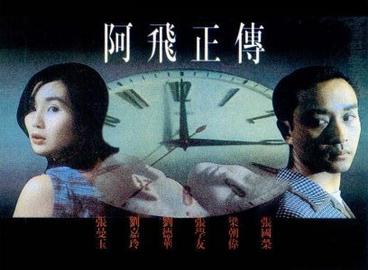- Days of Being Wild [阿飞正传](1990)
Full Movie with English Subtitles: https://www.youtube.com/watch?v=RXQfxyED7mA
The title (DAYS of Being Wild) and
the film poster both draw references to time – a clock being the central image.
The very first scene is explicitly related to time and memory, as the main
character Yuddy (Leslie Cheung) spends a minute with Su Li Zhen (Maggie
Cheung). This moment becomes significant later on in the film, when Yuddy is
asked what he was doing at that exact moment of the first scene. A recurring image in the film is one of a
clock ticking, which can be read in many different ways. In light of the
discussion on a post-colonial Hong Kong identity, the clock ticking represents
the imminence of Hong Kong’s handover to Chinese Communist rule in 1997. Yuddy
can encompass the problems that Hong Kong experiences regarding
post-colonialism. He is fluid and malleable, moving from one woman to another
without establishing any emotional connection with. Similarly, Hong Kong has
that same fluidity, it moves between East and West without ever establishing
its own position. Yuddy, who has been
living under his adopted mother, is searching for the identity of his birth
mother – a parallel to Hong Kong’s search for its own culture.
I enjoyed the scenes where the policeman
Tide (Andy Lau) and Li Zhen casually wander the streets of Hong Kong at nighttime.
Tide uses this moment to share his dreams about becoming a sailor, while Li
Zhen is able to find a source of comfort by having someone there for her. These
types of moments are so simple and yet so beautiful. You get that sense of
timelessness at that particular moment. In the scheme of things, both
characters go off in separate directions after that night. A very tragic scene is when Li Zhen rings
the payphone to speak to Tide but she doesn’t get answer. Tide would used to wait outside the payphone
kiosk for her call, but he ends up leaving Hong Kong before she calls him. Tide
ends up pursuing a career in sailing and bumps into Yuddy in the Philippines.
 |
| Tide (Andy Lau) and Li Zhen (Maggie Cheung) |
Here's an excerpt from a film review which I found very insightful as it provides some social critique. It's about how the film displays ideas of a lack of self worth and self pity throughout the film.
"The two female leads are young and naïve and not able to be see through Yuddy’s deception. They cling to a man who mistreats them and rejects them. Instead of accepting his true personality the women chase after him, and attempt to fight for his affection. The women’s lack of self confidence makes them yearn for an individual that berates and mistreats them. This aspect of the film is a direct reference to the mindset of many young Chinese women of that time, and it is a mindset that still holds true today."
Through watching different types of Asian films, I’ve become more appreciative of these experimental types of films - ones that are very ambiguous in nature and leave you pondering the events of the film. Days of Being Wild is best watched as part of the trilogy; things make more sense after you watch In the Mood for Love and you find many parallels between the two films.
Anyway, I’ve only touched on bits and pieces of Days of Being Wild in this post – there’s a lot more to appreciate about the film.
It's been called one of the best Hong Kong films produced, so it is definitely worth watching if you have the time!
It's been called one of the best Hong Kong films produced, so it is definitely worth watching if you have the time!


